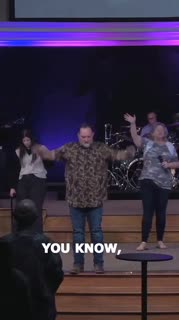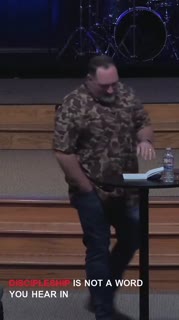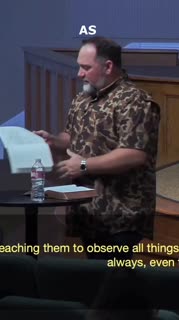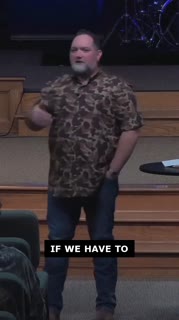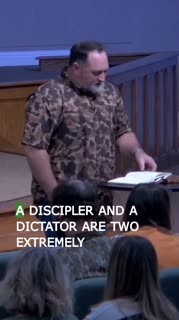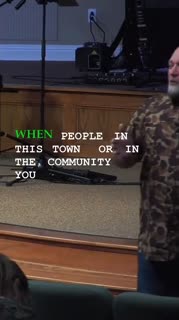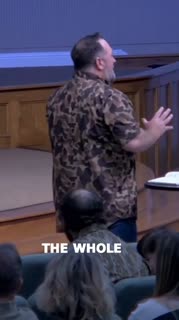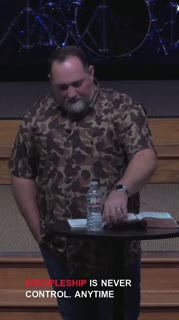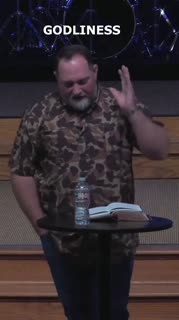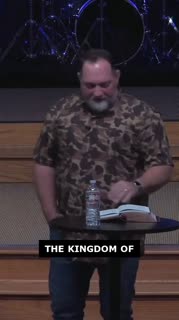Embracing the Call to Discipleship and Growth
Devotional
Sermon Summary
Bible Study Guide
Sermon Clips
Here are the selected quotes from the sermon transcript:
1. "You know, sometimes when things are going on in our life, we want to fixate on all the things that are going wrong. But the word of God says, it says in every season that it's the will of God to give thanks. So let's just thank him right now. No matter what's going on, no matter if it's been a great week or a horrible week or just a regular average week, just begin to thank him. Thank you, Lord. Thank you, Lord. Come on, let the fruit of your lips give thanks unto him. Let your ears hear your mouth thank the Lord. Thank you, Father. You're worthy and worthy to be praised. Thank you, Lord. You are good and your mercy endures forever." [00:30:48] (38 seconds)
2. "Discipleship is not a word you hear in the modern church much today. Disciple actually means to be an imitator of God, to be an imitator of God, imitating him. Did you know, as a believer, you don't, you, you not only have a responsibility to be discipled, but you also have a commission to make disciples. So a lot of times when, especially in the modern church, we think, well, I got to get saved. And then you don't hear a lot about discipleship. But even if you do hear about discipleship, it's, it's discipleship to you, not from you to someone else. But in the great commission, we actually have a commission to not only be a disciple, but also make disciples." [00:45:15] (39 seconds)
3. "As a believer, I think that we've made Jesus Lord of our life. If he's Lord, he's giving direction for our lives. His intended direction for the believer is to be a disciple, and then in turn, make disciples. So if we've made Jesus Christ Lord of our life, we say we're believers, and we've made him Lord of our lives. If he's the Lord of our life, then if he is the Lord of our life, then we've given him the right to direct our life. Amen. And if we've given him the right to direct our life, and we've surrendered the right to him because he is our Lord and he is our Savior. Amen. We say that all the time. Jesus is my Lord, right? Well, if he's our Lord, then we are looking for him for direction." [00:48:28] (41 seconds)
4. "If we have to be a disciple and make disciples, then he's going to have to help us through this process, and it takes two. It takes one. You have to humble yourself and allow yourself to be discipled. So I'm going to talk a lot about this today, because I've seen just over the years how when discipleship comes, it kind of gets mentioned in the church, things can get kind of strange. And I want to bring some balance to that, because you have to humble yourself and allow yourself to be discipled. I don't think that becoming a disciple is something that should be or really truly can be forced on somebody. You can't make somebody become a disciple." [00:48:47] (45 seconds)
5. "A discipler and a dictator are two extremely different people. I said a discipler and a dictator are two extremely different people. I want to kind of give you some of those examples. Discipleship is dependent on your desire to be discipled. I've had many different men and even women in my life as a Christian that have discipled me. And they've not all been perfect. Matter of fact, none of them have been perfect. Amen? But it wasn't their perfection that allowed the good of being discipled to come from them. It actually was me deciding that I was going to take the good, and if there was bad there, I was just going to discard that." [00:49:55] (48 seconds)
6. "When people in this town or in the community you live in or the home that you live in or the job that you go to, when they see you making changes for God, yeah, you might get a little bit of side-eye. And stuff like that. But when they start seeing you make real changes for God, and they start seeing you speak different, they start seeing you act different, people are going to start going, something's different. Come on. That's what grows the kingdom of God. When the growth of the kingdom of God, it goes further than just who's in the pulpit preaching the Word of God. It goes further and it goes faster, and it catches like wildfire when what is being preached from the pulpit gets on the inside of you, and then it goes from you." [00:57:48] (45 seconds)
7. "The whole reason why we're here today is so that you can get equipped to go and do the work of the ministry, which means making disciples. I don't feel qualified. Hey, I'm going to be honest with you. Neither do I sometimes. You don't have to feel qualified. What you have to do is obey God. Amen? Amen. He didn't tell his disciples, if you feel qualified, go out and do this. He said, no, you need to go out and make disciples. And then when you make disciples, command them to do the things that I've taught you to do. Amen? Is this okay?" [00:59:48] (35 seconds)
8. "Discipleship is never control. Anytime you see control in any relationship, you are seeing something. Bear with me. Anytime you see control in a relationship, you are not seeing something godly, you're seeing something. You're seeing something demonic. I'm not talking about full-blown possession. But if someone is trying to control another human being, and I'm not talking about putting little leashes on your two-year-old when you go somewhere, okay, that's fine. Shot callers are preferable. But I'm talking about a narcissistic, domineering, controlling, whether it's coming from a pulpit, whether it's coming from a business, whether it's coming from a spouse, whether it's coming from any area in life. If you are dominating and controlling someone or see a relationship like that, that does not come from God because God doesn't do that." [01:20:11] (59 seconds)
9. "Godliness is free will, obedience, love, submission, and honor. Well, let's not forget, let's not forget that God loved you so much. So you're not, if you submit to God, it's not like you're the first person to submit and it's not like you're even submitting on the same level because the first person to submit was Jesus. Jesus submitted to you before you ever thought about submitting to him. It's like Jesus didn't submit. Yes, he did. He stepped down out of heaven into a fleshly body. I think that's submitting. He came to a place that he did not deserve to come to and he went through things that he did not deserve to go through because he wanted to love you and give his life for you so that you could have the free will of making him Lord of your life or not because he wanted what was best for you." [01:22:30] (49 seconds)
10. "The kingdom of God works off of free will, love, submission, and honor. It does not work off of control, guilt, shame, condemnation, and manipulation. Nevertheless, we are commanded to be a disciple and to make disciples and it must be done without an ounce of control, force. Go over to John, John the 8th chapter. We're about done. Everybody said, yes, you are. You're about done. Listen. Listen, when it comes to building the church, the Bible says that you have to do it carefully. Amen? And if you're going to do it carefully, there are some of these things that you have to stand up for." [01:23:13] (48 seconds)
Ask a question about this sermon
1. "You know, sometimes when things are going on in our life, we want to fixate on all the things that are going wrong. But the word of God says, it says in every season that it's the will of God to give thanks. So let's just thank him right now. No matter what's going on, no matter if it's been a great week or a horrible week or just a regular average week, just begin to thank him. Thank you, Lord. Thank you, Lord. Come on, let the fruit of your lips give thanks unto him. Let your ears hear your mouth thank the Lord. Thank you, Father. You're worthy and worthy to be praised. Thank you, Lord. You are good and your mercy endures forever." [00:30:48] (38 seconds)
2. "Discipleship is not a word you hear in the modern church much today. Disciple actually means to be an imitator of God, to be an imitator of God, imitating him. Did you know, as a believer, you don't, you, you not only have a responsibility to be discipled, but you also have a commission to make disciples. So a lot of times when, especially in the modern church, we think, well, I got to get saved. And then you don't hear a lot about discipleship. But even if you do hear about discipleship, it's, it's discipleship to you, not from you to someone else. But in the great commission, we actually have a commission to not only be a disciple, but also make disciples." [00:45:15] (39 seconds)
3. "As a believer, I think that we've made Jesus Lord of our life. If he's Lord, he's giving direction for our lives. His intended direction for the believer is to be a disciple, and then in turn, make disciples. So if we've made Jesus Christ Lord of our life, we say we're believers, and we've made him Lord of our lives. If he's the Lord of our life, then if he is the Lord of our life, then we've given him the right to direct our life. Amen. And if we've given him the right to direct our life, and we've surrendered the right to him because he is our Lord and he is our Savior. Amen. We say that all the time. Jesus is my Lord, right? Well, if he's our Lord, then we are looking for him for direction." [00:48:28] (41 seconds)
4. "If we have to be a disciple and make disciples, then he's going to have to help us through this process, and it takes two. It takes one. You have to humble yourself and allow yourself to be discipled. So I'm going to talk a lot about this today, because I've seen just over the years how when discipleship comes, it kind of gets mentioned in the church, things can get kind of strange. And I want to bring some balance to that, because you have to humble yourself and allow yourself to be discipled. I don't think that becoming a disciple is something that should be or really truly can be forced on somebody. You can't make somebody become a disciple." [00:48:47] (45 seconds)
5. "A discipler and a dictator are two extremely different people. I said a discipler and a dictator are two extremely different people. I want to kind of give you some of those examples. Discipleship is dependent on your desire to be discipled. I've had many different men and even women in my life as a Christian that have discipled me. And they've not all been perfect. Matter of fact, none of them have been perfect. Amen? But it wasn't their perfection that allowed the good of being discipled to come from them. It actually was me deciding that I was going to take the good, and if there was bad there, I was just going to discard that." [00:49:55] (48 seconds)
6. "When people in this town or in the community you live in or the home that you live in or the job that you go to, when they see you making changes for God, yeah, you might get a little bit of side-eye. And stuff like that. But when they start seeing you make real changes for God, and they start seeing you speak different, they start seeing you act different, people are going to start going, something's different. Come on. That's what grows the kingdom of God. When the growth of the kingdom of God, it goes further than just who's in the pulpit preaching the Word of God. It goes further and it goes faster, and it catches like wildfire when what is being preached from the pulpit gets on the inside of you, and then it goes from you." [00:57:48] (45 seconds)
7. "The whole reason why we're here today is so that you can get equipped to go and do the work of the ministry, which means making disciples. I don't feel qualified. Hey, I'm going to be honest with you. Neither do I sometimes. You don't have to feel qualified. What you have to do is obey God. Amen? Amen. He didn't tell his disciples, if you feel qualified, go out and do this. He said, no, you need to go out and make disciples. And then when you make disciples, command them to do the things that I've taught you to do. Amen? Is this okay?" [00:59:48] (35 seconds)
8. "Discipleship is never control. Anytime you see control in any relationship, you are seeing something. Bear with me. Anytime you see control in a relationship, you are not seeing something godly, you're seeing something. You're seeing something demonic. I'm not talking about full-blown possession. But if someone is trying to control another human being, and I'm not talking about putting little leashes on your two-year-old when you go somewhere, okay, that's fine. Shot callers are preferable. But I'm talking about a narcissistic, domineering, controlling, whether it's coming from a pulpit, whether it's coming from a business, whether it's coming from a spouse, whether it's coming from any area in life. If you are dominating and controlling someone or see a relationship like that, that does not come from God because God doesn't do that." [01:20:11] (59 seconds)
9. "Godliness is free will, obedience, love, submission, and honor. Well, let's not forget, let's not forget that God loved you so much. So you're not, if you submit to God, it's not like you're the first person to submit and it's not like you're even submitting on the same level because the first person to submit was Jesus. Jesus submitted to you before you ever thought about submitting to him. It's like Jesus didn't submit. Yes, he did. He stepped down out of heaven into a fleshly body. I think that's submitting. He came to a place that he did not deserve to come to and he went through things that he did not deserve to go through because he wanted to love you and give his life for you so that you could have the free will of making him Lord of your life or not because he wanted what was best for you." [01:22:30] (49 seconds)
10. "The kingdom of God works off of free will, love, submission, and honor. It does not work off of control, guilt, shame, condemnation, and manipulation. Nevertheless, we are commanded to be a disciple and to make disciples and it must be done without an ounce of control, force. Go over to John, John the 8th chapter. We're about done. Everybody said, yes, you are. You're about done. Listen. Listen, when it comes to building the church, the Bible says that you have to do it carefully. Amen? And if you're going to do it carefully, there are some of these things that you have to stand up for." [01:23:13] (48 seconds)
